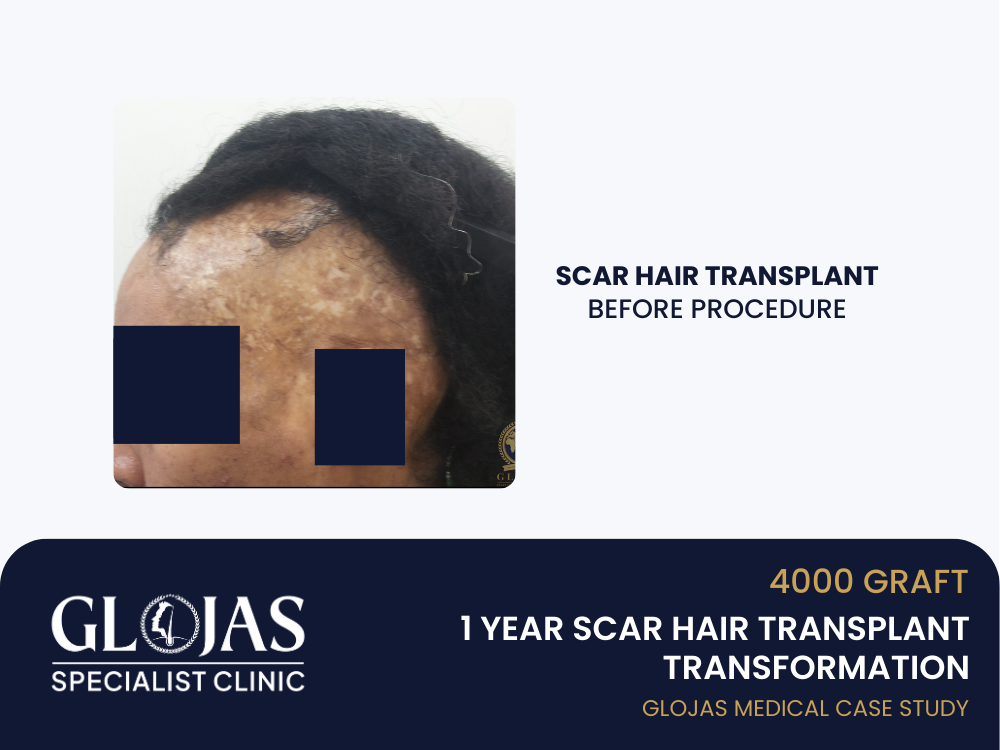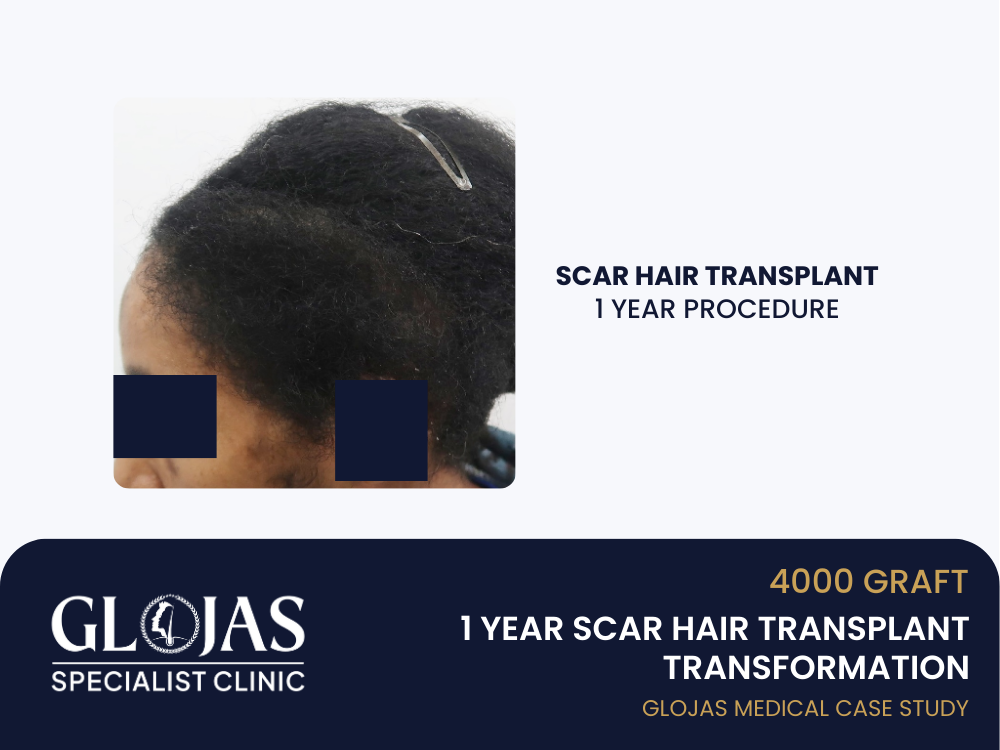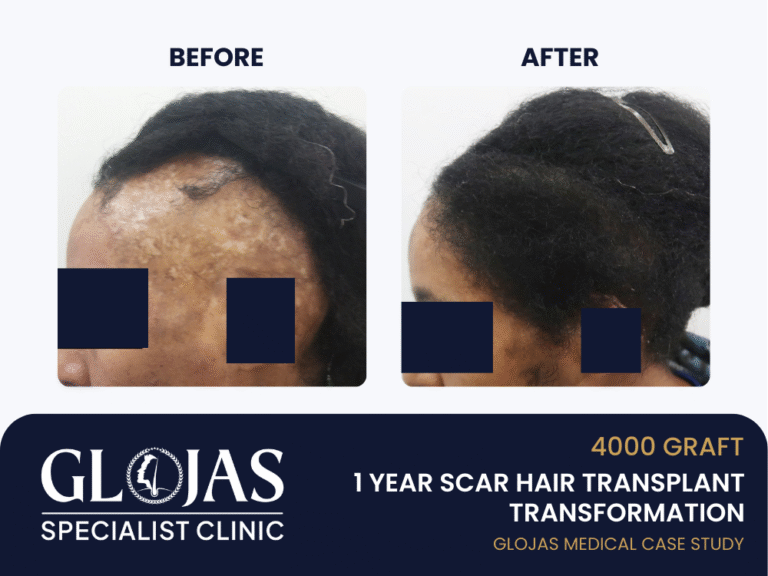Scars on the scalp — especially from burns — can be deeply traumatic. Beyond the physical wound, they can leave emotional scars that affect confidence, self-image, and daily life. Hair is a defining feature for women, and hair loss in visible areas can be devastating.
This case study documents the journey of a 37-year-old woman who underwent a SMART™ FUE Scar Hair Transplant, using 4,000 grafts to restore hair growth over a second-degree burn scar on the left side of her scalp. Her recovery over one year showcases the potential of modern scar revision with hair restoration.
Patient Background
Name: Ms. A (identity protected)
Age: 37
Condition: Second-degree thermal burn sustained in childhood
Scar Area: 8×6 cm on the left parietal scalp (above ear)
Issue: No hair growth over scar tissue; visible scalp patch
Emotional Impact: High self-consciousness, always wore hair covering or scarves
Ms. A had tried hair fibers, wigs, and camouflage sprays — but none offered a permanent solution. After years of discomfort, she consulted a specialist to explore a surgical option.
Consultation & Assessment – Scar Hair Transplant
During her consultation, Ms. A underwent:
Trichoscopy to assess the vascularity of scar tissue
Scalp laxity test
Donor area analysis (occipital region)
Key Findings:
Scar was mature and stable (no inflammation)
Good vascularization over the scar (crucial for graft survival)
The donor area had a high density (>90 grafts/cm²)
Hair shaft was medium-thick, ideal for coverage
The specialist concluded she was a good candidate for SMART™ FUE, with a high chance of placing grafts even into scarred skin.
What Is SMART™ FUE?
SMART™ (Scalp Micro-Advanced Restoration Technique) is a refined version of FUE designed for:
High-precision graft extraction
Minimal trauma to both donor and recipient sites
Better survival in scarred or compromised skin
Natural angling and spacing for realistic results
Ideal for scalp scar revision cases
Treatment Plan
Total grafts planned: 4,000
3,000 for the scar region
1,000 for blending into the surrounding hair for seamless transition
Session plan: 1 extended session (10 hours with breaks)
Goal: Achieve at least 50–60% density restoration over the scar, mimicking natural hair flow
Procedure Day Summary

Duration: 10 hours, under local anesthesia
Team: Lead surgeon + 2 technicians
Steps:
Hairline and scar boundaries marked
4,000 grafts harvested from the occipital donor zone
Grafts are sorted and preserved in chilled nutrient solution
Recipient sites created using micro-incision blades
Grafts are implanted carefully at specific angles to match the natural hair pattern
Special care was taken to avoid overloading the scar tissue, ensuring good blood flow for healing and regrowth.
Recovery Timeline

Day 1–5: Mild redness and swelling; no pain
Days 6–10: Formation of scabs; no scratching allowed
Week 3–4: Normal shedding (shock loss) begins
Months 2–3: Dormant phase – little visible change
Months 4–6: Early regrowth observed
Months 9–12: Final density develops, thickening and maturing
1-Year Results

At her 12-month review, Ms. A’s outcome was life-changing.
| Area | Before Transplant | After 1 Year |
|---|---|---|
| Burn Scar | Smooth, hairless, 8×6 cm area visible | 80–90% coverage with even growth |
| Transition Zone | Noticeable line between scar & hair | Seamlessly blended into native hair |
| Emotional State | Low confidence, social anxiety | High confidence, wears hair freely |
Photos confirmed a dense, natural hairline around the scar, with improved growth, texture, and thickness.
Patient Feedback
“For the first time in over 25 years, I can tie my hair without worry. I feel like myself again.”
She reported a complete shift in self-esteem and social engagement, and no longer relied on head coverings to feel comfortable.
Maintenance & Aftercare
Gentle hair products are used
Monthly hair strengthening treatments (optional)
No medication required post-procedure
Annual check-ins recommended
5 Frequently Asked Questions (FAQ)
1. Can hair grow on burn scars?
Yes — if the scar is mature, stable, and has an adequate blood supply, modern techniques like SMART™ FUE can restore hair growth on scarred tissue.
2. Do grafts survive well on scar tissue as on healthy skin?
Graft survival is slightly lower in scar tissue (80–90%), but SMART™ FUE improves odds significantly by minimizing trauma and optimizing angling.
3. How many grafts are needed for a burn scar?
Depends on the size of the scar. In this case (8×6 cm), 4,000 grafts were used — 3,000 for the scar and 1,000 to blend surrounding areas.
4. Will the transplanted hair look and grow like normal?
Yes. Once healed, the transplanted hair grows like natural hair — it can be washed, styled, trimmed, or dyed normally.
5. Is this result permanent?
✅ Yes. Hair taken from the donor zone (usually the back of the scalp) is resistant to hormonal loss and typically lasts a lifetime.
Final Thoughts
This case proves that even complex conditions, such as burn scars on the scalp, can be transformed through advanced hair restoration techniques.
With SMART™ FUE, patients like Ms. A no longer have to live with the daily reminder of past trauma. After 1 year, she now enjoys a full head of hair and a renewed sense of self.
If you’re living with hair loss from a scar, this treatment could be the permanent solution you’ve been waiting for.
